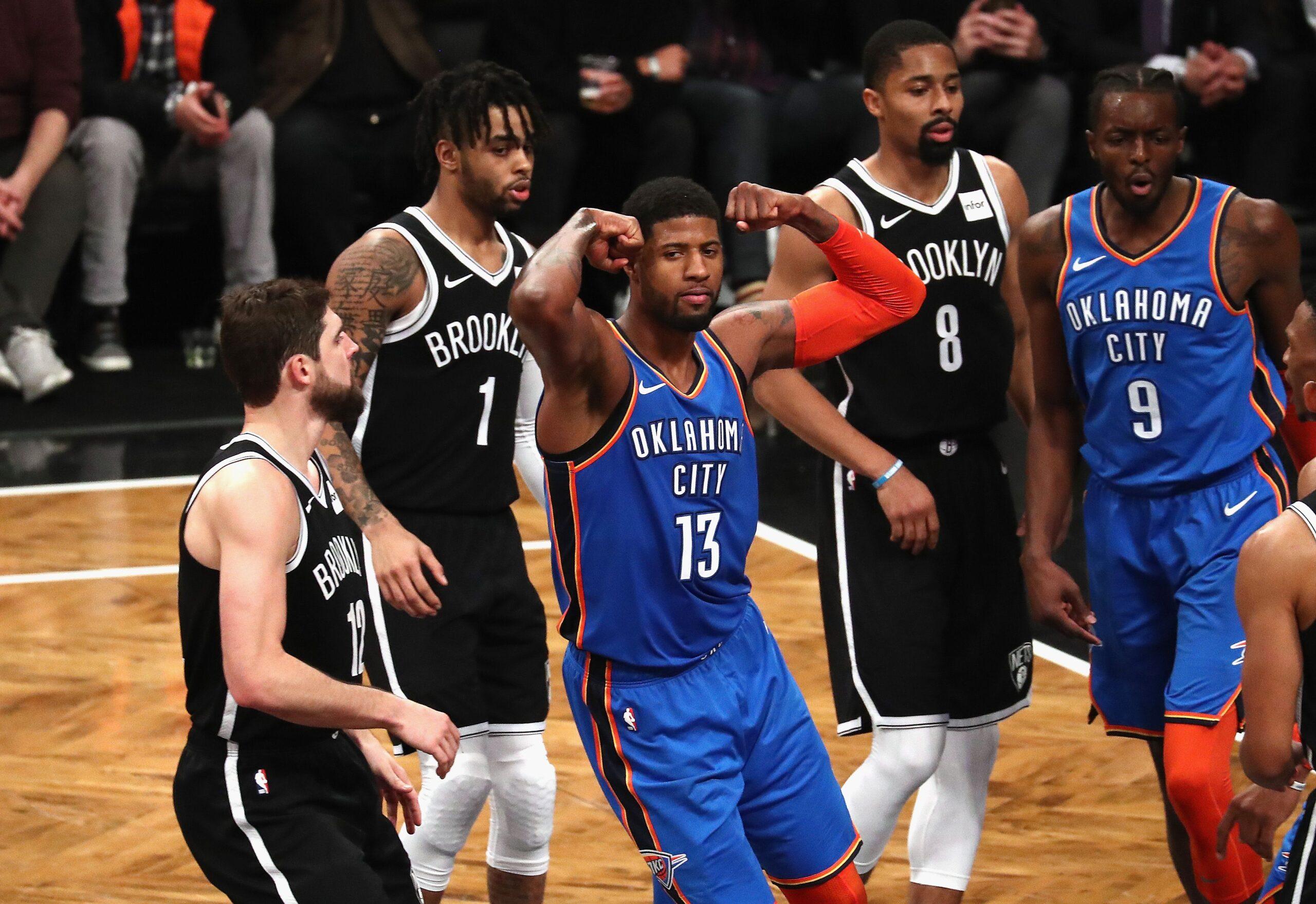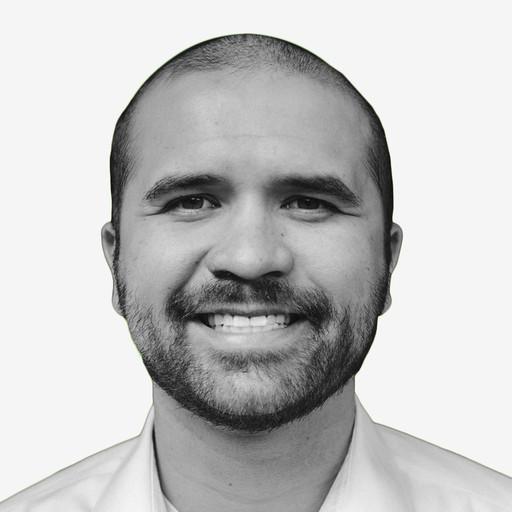The Thunder aren’t just the Russell Westbrook show anymore. Although they lived and died with their star point guard in their first two seasons without Kevin Durant, collapsing as soon as Westbrook left the floor, he’s no longer the only cornerstone in Oklahoma City. Paul George signed a four-year, $137 million extension in the offseason, giving them the long-term security to build around him as well. They have gotten younger and more athletic around their two All-Stars, allowing them to blanket the floor on defense.
The Thunder now have an identity beyond giving Westbrook the ball and hoping for the best. That’s what’s brought the Thunder to the top of the Western standings with a 17-8 record.
Westbrook has taken a step back this season. He dropped from no. 1 in the league in touches per game (95.7) to no. 3 (86.5), and he’s taking fewer shots (19.4 per game) than he has since Durant left. He has even cleaned up his shot selection, with only 26.1 percent of his field goal attempts coming in the long 2-point range between 10 feet and the 3-point line, compared to 39.8 percent last season. Westbrook would almost be the model of efficiency if he weren’t shooting 21.8 percent from 3 on 5.1 attempts per game. There’s still no one in Oklahoma City keeping him in line. He’s just reining himself in a little more.
The Thunder don’t need Westbrook to do quite as much. They went 5-1 when he went down with a sprained ankle in November, and they have a net rating of -0.4 in his 629 minutes on the bench this season. Dennis Schröder, whom they acquired from the Hawks for Carmelo Anthony in an exchange of problem children, is the most overqualified backup point guard in the NBA. He’s averaging 16.8 points on 42.7 percent shooting and five assists per game this season, and he can do a passable Westbrook imitation when plugged into the starting lineup.
Oklahoma City is built around an overwhelming amount of length and athleticism. After getting off to an 0-3 start, it doubled down on both its strengths and weaknesses by benching Patrick Patterson for Jerami Grant, an all-world athlete and inconsistent shooter. Grant, at 6-foot-9 and 220 pounds with a 7-foot-3 wingspan, is a hyper-athletic wing who can defend players at all five positions. A frontcourt of Grant, Steven Adams, and Paul George stifles opposing teams, regardless of who the point guard is. That trio has a net rating of plus-13 in 373 minutes with Westbrook and plus-14 in 313 minutes with Schröder.
An NBA defense is only as strong as its weakest link. The Thunder have the no. 1 rated defense in the league because they’ve eliminated most of their weak links. The normal offensive playbook doesn’t work against them. With Carmelo in NBA purgatory and Patterson on the bench, there’s nowhere to attack in the pick-and-roll. Adams is an elite interior defender, while George and Grant can switch every screen and cover for him on the back side when he extends out on the perimeter. Look at how much space Grant covers on the back side of these plays:
Their formula is working. They are no. 2 in the league in defending the ball handler in the two-man game and no. 5 in defending the roll man. They don’t allow 3-pointers (fourth fewest in the NBA), they jump passing lanes (no. 1 in steals and no. 2 in loose balls recovered per game), and they use their collective speed to get out in transition (no. 7 in pace).
It’s hard to create space against a team who has a plus athlete with size at every position. Westbrook, Grant, George, and Adams could all win decathlons against the other starters at their position around the league. The biggest question mark in the starting lineup is Terrance Ferguson, the no. 21 overall pick in the 2017 draft, and he still fits that mold. At 6-foot-7 and 190 pounds, Ferguson is a quick-twitch dynamo who can play above the rim and looks like he was shot out of a cannon when attacking closeouts. While he’s still raw after skipping college to play in Australia and only getting spot minutes as a rookie, he makes up for some of his mistakes by throwing his body around and playing with energy.
Grant (24) and Ferguson (20) are part of a broader generational shift in Oklahoma City. They replaced Carmelo (34) and Corey Brewer (32) in the starting lineup, while Schröder (25) is the primary backup point guard instead of Ray Felton (34). The Thunder also signed Nerlens Noel (24) to be their backup center and are giving minutes on the wing to second-round pick Hamidou Diallo (20). The days of them bringing in veterans like Kendrick Perkins and Derek Fisher to mentor Westbrook are over. Russ is in his 11th season in the NBA. He’s now the mentor to younger players who grew up watching him.
Everyone in Oklahoma City understands their role. Westbrook, George, and Schröder are their only rotation players with a usage rate above 20. George seems more comfortable now that his future is settled, and the Thunder are more comfortable with him in Year 2. He no longer has to carry the offense by himself when Russ is out. He’s always playing with either Westbrook or Schröder, which allows him to thrive in his more natural role as a secondary playmaker. The 28-year-old is a five-time All-Star at the peak of his game, averaging career highs in points (24.3), rebounds (7.8), assists (4.3), steals (2.2), blocks (0.8), and 3-point attempts (8.9).
George isn’t running the offense, but he is the team’s most indispensable player. They don’t have anyone who can replace his two-way ability. There aren’t many players in the NBA with his length and athleticism who can also shoot 3s at a high level. The Thunder don’t have enough 3-and-D players, so they have to make a trade-off between the “3” and “D” when making roster and rotation decisions, and they almost always chose the latter. Defenses pack the paint against Oklahoma City and dare them to shoot: They are no. 16 in the league in 3-point attempts per game (31.4) and no. 29 in 3-point percentage (31.9). Their poor shooting would be a death sentence if they didn’t have an elite defense of their own.

The Thunder could become even more one-sided whenever Andre Roberson, an elite defender and historically inaccurate shooter, returns from the patellar tendon injury he suffered last season. He recently had a setback in the rehabilitation that will keep him out for at least another month. Roberson was the backbone of the Thunder’s defense in their first two seasons without Durant, but their starting five has been fine without him this season. His presence could help their bench. They don’t have a deep roster, and they’ve struggled when both George and Westbrook have been out. Schröder, who is almost always playing in those situations, is minus-2.4 in 159 minutes without either of the team’s two All-Stars this season.
There are questions about OKC’s crunch-time lineups, too. Billy Donovan has been closing games with Westbrook and Schröder, which doesn’t leave much space on offense, especially if they are playing with Grant and Adams. George is the only proven 3-point shooter in those lineups, although Schröder (34.3 percent on 4.1 attempts per game) and Grant (39.0 percent on 3.1 attempts) have been respectable this season. The only way for the Thunder to create driving lanes for their point guards is to go smaller with a wing in place of Adams or George.
OKC doesn’t have many options at that spot. Alex Abrines, the best shooter of the bunch, is also the weakest defender. Diallo, the best athlete, is a non-shooter. Ferguson has the most two-way potential, which is why he won the starting spot in the first place. He’s a willing defender, but he has such a limited role in the offense that his impact comes down to whether he’s knocking down 3s: 63 percent of his field goal attempts this season have come from beyond the arc. He shot 5-for-22 from 3 (22.7 percent) in his first 10 games this season and 10-for-28 (35.7 percent) over his past nine. He shows flashes of real talent, but he’s still learning on the job. Oklahoma City needs to put him in a time machine and accelerate his development over the next few months.
Donovan has experimented with an interesting small-ball lineup over the past week: Westbrook and Schröder in the backcourt with Ferguson and George on the wings and Grant as the center. That unit has just enough 3-point shooting to space the floor around a pick-and-roll of Westbrook and Grant, and they have the defensive versatility to switch any screen not involving Schröder. Grant has the tools to be an elite small-ball 5. He can switch screens while still protecting the rim, and he can finish on the pick-and-roll while also making plays in four-on-three situations. Most importantly, putting a player with his shooting ability at center can unlock Westbrook at the end of games.
Adams is a great center, but he has limitations that can be exposed next to a non-shooting point guard. Rudy Gobert shut down the pick-and-roll between Adams and Westbrook in last season’s playoffs because neither player could drag him out of the paint. Westbrook is at his best when playing downhill, and there’s not much any defense could do to slow him down if he were playing in a spread floor with four shooters. He’s such an incredible athlete that he can still finish inside over multiple defenders, and the Thunder have leveraged that ability by putting defensive-minded players around him and having him carry the offense through sheer force of will. Oklahoma City has never given him the opportunity to play in max space.
It’s easy to be jaded by Westbrook. He’s averaging a triple double (22.1 points, 10.6 rebounds, and 10.2 assists) on the fourth-best field goal percentage of his career (44.7), but no one cares because he hasn’t won a playoff series without Durant. His assault on the NBA record books becomes more impressive when you look at how little spacing he has around him. The Thunder have been in the bottom seven in the league in 3-point percentage in each of the past three seasons. He has never played with as much perimeter firepower as Giannis Antetokounmpo has in Milwaukee this season or James Harden had last season in Houston.
There’s only so much that any one player can do. The Bucks added shooters after losing in the first round last season. The Rockets aren’t even in the playoff picture right now after losing a few role players from a 65-win team. Westbrook might not be able to do as much as Giannis or Harden in their respective roles, but the Thunder have never given him the chance to find out. They are running out of time. He’s a 6-foot-3 guard in his 30s who relies on his athleticism and underwent knee surgery in the offseason. They now have a team that can survive without him, but they still don’t have one that truly complements his game.
